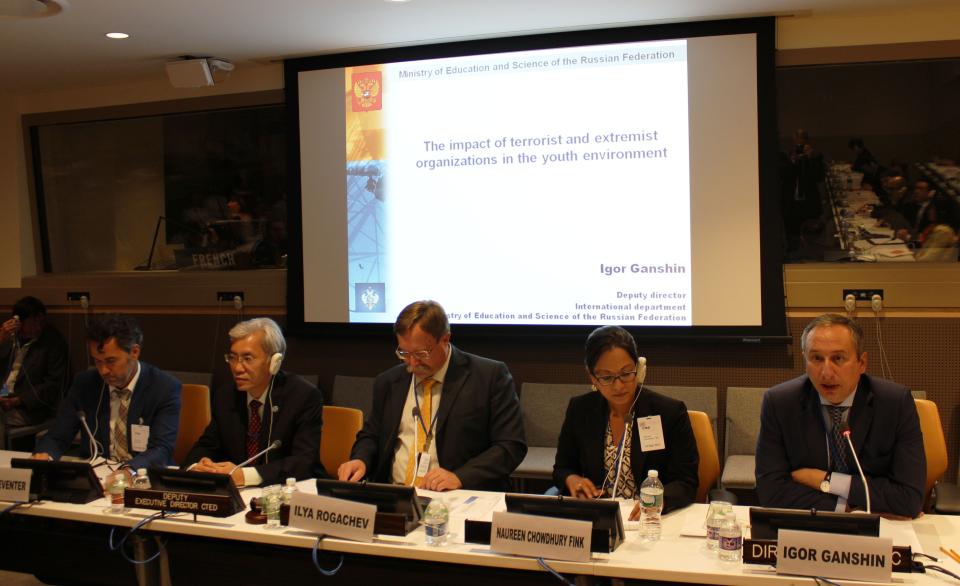
Director Ilya Rogachev with the Ministry of Foreign Affairs of the Russian Federation in the centre, with Deputy Director of the Human Security Collective Fulco van Deventer and DED of CTED Weixiong Chen to the left; Head of Research and Analysis of the Global Center on Cooperative Security Naureen C. Fink and (speaking) Deputy Director Igor Ganshin with the Ministry of Education and Science of the Russian Federation to the right.
The Chair in the centre, with USG Jeffrey Feltman and DED of CTED Weixiong Chen to the left, and with the Director of the Security Council Division Movses Abelian and ASG Ivan Simonovic to the right.National Security Director Jonathan Allen of the Foreign and Commonwealth Office of the United Kingdom intervening during one of the sessions.Director Ilya Rogachev with the Ministry of Foreign Affairs of the Russian Federation in the centre, with Deputy Director of the Human Security Collective Fulco van Deventer and DED of CTED Weixiong Chen to the left; Head of Research and Analysis of the Global Center on Cooperative Security Naureen C. Fink and (speaking) Deputy Director Igor Ganshin with the Ministry of Education and Science of the Russian Federation to the right.The Counter-Terrorism Committee’s special event for the 10th anniversary of Security Council resolution 1624 drew a full house.
The Security Council, meeting at the level of Heads of State and Government in September 2005, adopted resolution 1624, which addresses the threat posed by incitement to commit terrorist acts. With the threat evolving and increasing, including through terrorist groups such as Da’esh using the Internet and social media, the resolution and the issue are even more relevant today. On 14 September 2015, exactly one decade after the resolution was adopted, Member States, UN entities, civil society representatives, and experts met to highlight the anniversary and take stock of achievements made and challenges that remain in preventing and countering incitement.
Led by the Chair of the Counter-Terrorism Committee, H.E. Ambassador Raimonda Murmokaité, Permanent Representative of Lithuania to the United Nations, the opening session of the special event included a number of speakers: Under-Secretary-General for the Department of Political Affairs Jeffrey Feltman, representing United Nations Secretary-General Ban Ki-moon; Assistant Secretary-General Ivan Simonovic with the Office of the United Nations High Commissioner for Human Rights; Mr. Ilya Rogachev, Director for the Department of new challenges and threats, Ministry of Foreign Affairs of the Russian Federation; and Mr. Jonathan Allen, National Security Director, Foreign and Commonwealth Office, United Kingdom. The Counter-Terrorism Committee Executive Directorate (CTED) was represented by Deputy Executive Director Weixiong Chen.
“Security Council resolution 1624 represented an historic step in confronting the threat. By targeting incitement, the resolution called the international community’s attention to the messages that often precede acts of terrorism. Even as we insist on the fundamental importance of protecting the right to freedom of expression, there can be no protection of the law for calls to violence that create a danger that those listening will act on such calls,” stressed Mr. Feltman.
Following opening remarks, the special event continued with three thematic discussions: Session one – chaired by the UK – focused on the prohibition and prevention of incitement to commit a terrorist act or acts. Panellists included Dr. Bibi van Ginkel, Senior Research Fellow with the International Centre for Counter-Terrorism (ICCT); Mr. Yuri Khokhlov, Head of the Department of Oversight of the Implementation of Federal Security Legislation, Inter-Ethnic Relations, and Countering Terrorism and Extremism, with the Office of the Prosecutor-General of the Russian Federation; Mr. Nicholas Jaques, International advisor with Prevent, Office for Security and Counter-Terrorism, Home Office of the United Kingdom; and Mr. Matteo Pasquali, United Nations Office of Drugs and Crime, Terrorism Prevention Branch.
Session two – chaired by CTED – concentrated on options for international co-operation, and dialogue among civilizations. Panellists were Mr. Emmanuel Roux, Head of the New York Office of INTERPOL; Ms. Judith Lichtenberg, Executive Director of the Global Network Initiative; and Mr. Matthew Hodes, Director with the United Nations Alliance of Civilizations.
Session three, finally – chaired by Russia – discussed countering incitement of terrorist acts motivated by extremism and intolerance. Panellists included Mr. Igor Ganshin, Deputy Director of the International Department of the Ministry and Education and Science, Russian Federation; Mr. Fulco van Deventer, Deputy Director of the Human Security Collective; and Ms. Naureen Chowdury Fink, Head of Research and Analysis, Global Center on Cooperative Security.
Deputy Executive Director of CTED Weixiong Chen closed the special event by reminding participants that “There is no easy way to ensure success, but if we forge ahead together, I am sure that we will be getting closer to our goals as outlined in resolutions 1624 and 2178, and the Secretary-General’s upcoming Plan of Action on Preventing Violent Extremism.”
A webcast of the special event is available here. The agenda can be accessed here.
Remarks by USG of DPA Jeffrey Feltman
Statement by ASG of OHCHR Ivan Simonovic
Remarks by Matteo Pasquali, UNODC/TPB
Presentation of Dr. Bibi van Ginkel (ICCT)
Presentation of Dr. Judith Lichtenberg (GNI)

